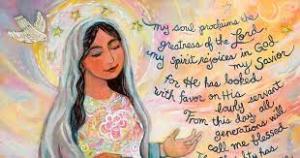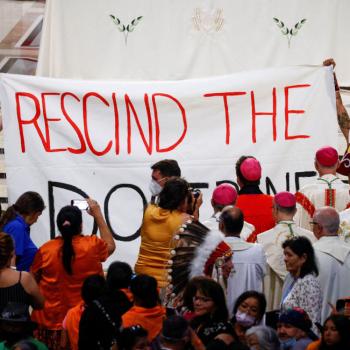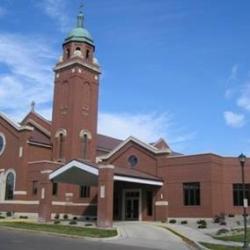
I suppose I ought to say that the two contexts of Jesus’ ministry on earth were sin and grace. But from the beginning of Luke’s Gospel, which I’m following in these posts, what we see is poverty and power. Needless to say poverty and power were not evenly or fairly distributed in Jesus’ world (or any that I know of). What did that mean for Jesus and the evangelist Luke? Jesus’ concern was the Kingdom of God, but Christians have tended to spiritualize God’s kingdom. This post argues that, in Jesus’ and Luke’s minds, the Kingdom of God was never remote from the material conditions under which people lived in the kingdoms of this world.
Fourth in a series on social justice in the Gospel of Luke. For assistance in this series I rely mainly on two Bible scholars. Kenneth E. Bailey in Poet and Peasant and Through Peasant Eyes interprets Jesus’ parables in Luke. John Howard Yoder’s The Politics of Jesus helped Christians recognize Jesus’ concern for social justice, paying special attention to the Gospel of Luke.
After an introductory chapter (see this post) Yoder surveys the Gospel of Luke in a chapter he calls ”The Kingdom Coming.” This chapter will require several posts. Here I’m dealing with Luke’s so-called “infancy narrative.” It’s the story of two births, of John the Baptizer, son of Elizabeth and Zechariah, and Jesus, son of Mary. What is Luke telling us about where God stands in relation to the world’s poverty and power?
God’s favor toward the poor
Yoder begins his second chapter with two war-like hymns. Through centuries of repetition, the Church seems to have forgotten their militant tone. Mary’s “Magnificat” (My Soul Magnifies the Lord” and Simeon’s “Nunc dimitis” (Now you may dismiss your servant”) are constants in the Church’s liturgical morning and evening prayers, respectively. I’ll get to these great biblical prayers shortly. First, I want to look at how often God gives special attention or favor to the poor and powerless in Luke’s first two chapters. For Luke this unequal privileging in his world is important enough to mention at least six times:
- God grants a child to Elizabeth in her old age, to her who had been barren. “So has the Lord done for me at a time when he has seen fit to take away my disgrace before others.” (Luke 1:25)
- The Angel Gabriel appears to Mary: “Hail, favored one! The Lord is with you.” (1:28)
- On a visit to cousin Elizabeth, Mary praises God’s great deeds: “For he has looked upon his handmaid’s lowliness.” (1:48)
- Elizabeth, who had been barren, gives birth in her old age to a son. Her neighbors rejoice with her because “the Lord has shown his great mercy toward her.” (1:58)
- Zechariah, after John the Baptizer’s birth, praises “the tender mercy of our God by which the daybreak from on high will visit us to shine on those who sit in darkness and death’s shadow.” (1:68)
- Angels sing to poor, despised shepherds of the Messiah’s birth: “Glory to God in the highest and on earth peace to those on whom his favor rests.”( 2:14)
This last favor sums up all the rest. The new, more accurate translation (see this post), shows that God doesn’t favor everyone equally. God especially favors the poor.
Poverty and power and two revolutionary prayers
Here are some lines from Mary’s prayer the Magnificat:
He has shown might with his arm, dispersed the arrogant of mind and heart. He has thrown down the rulers from their thrones but lifted up the lowly. (Luke 2:31-32)
In any other book but the Bible, these lines would be about revolution. Yoder makes us wonder, Why should the Bible be different? Mary’s prayer reads like “the one whose birth is now being announced is to be an agent of radical social change.” (Yoder, p. 27)
In Luke’s Gospel the birth of John the Baptizer and his father Zechariah’s prayer comes shortly after Mary’s prayer. Zechariah praises God for
… salvation from our enemies and from the hand of all who hate us.… (1:71)
Jesus has come “to break the bondage of his people” (Yoder, p. 27), and it doesn’t look much like spiritual bondage. It looks more political.
Politics at the start of Luke’s Gospel
Luke brings up politics at the very beginning of his story. It’s setting in time is “in the days of King Herod, King of Judea….” (1:5) Luke isn’t simply being a historian here. Biblical authors aren’t all that concerned about getting history right, and Luke wasn’t too careful about secular history. He sets Jesus’ birth in the time “when Quirinius was governor of Syria.” Quirinius wasn’t governor of Syria until 10 years after Jesus was born. The census that would draw Mary and Joseph to Bethlehem is either historical fiction or another anachronism. But Jesus really was born “in the days of King Herod.” When Luke makes a historical, political claim, especially when he gets it right, it’s because it belongs in the story he wants to tell. Herod is not just a detail that some people might find interesting.
Sin and grace actually are all over Luke’s story, but these spiritual things are embedded in a world of poverty and power, of extremes of inequality and the powers that sustain such a sinful system. As Luke’s Gospel continues, Jesus will deal powerfully with that system.















